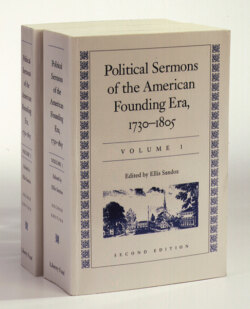Читать книгу Political Sermons of the American Founding Era: 1730–1805 - Группа авторов - Страница 58
На сайте Литреса книга снята с продажи.
ОглавлениеSAMUEL SHERWOOD (1730–1783). A 1749 graduate of Yale, Sherwood took his second degree there also and was later awarded an A.M. by the College of New Jersey at Princeton, where he tutored and where his uncle, Aaron Burr, Sr., was president. In 1757 he settled in Weston, Connecticut, as the first pastor of a church consisting of twelve members. There he remained for the rest of his relatively short life.
Only two of Sherwood’s sermons have survived, and they are accorded such importance that both are reprinted in the present volume. The first, entitled Scriptural Instructions to Civil Rulers, and all Free-born Subjects (1774), is one of the most famous of all Revolutionary War sermons. An “address to the Freemen of the Colony” of Connecticut, it takes as one of its title-page epigraphs Acts 22:28: “And the chief Captain answered, With a great sum obtained I this freedom; and Paul said, but I was born free.” Ranging through biblical and classical sources, and appealing to the English constitution as well, Sherwood eloquently urges the necessity of just rule for free men. In a passage reminiscent of Patrick Henry’s famous speech, he writes: “No free state was ever yet enslaved and brought into bondage, where the people were incessantly vigilant and watchful; and instantly took the alarm at the first addition made to the power exercised over them.”
A long Appendix (some forty pages in the original) has been omitted here. Written by Ebenezer Baldwin, pastor of Danbury and a powerful voice in the move to revolution, it details the transgressions of Britain against its American colonies. It sounds the persistent refrain: “When our lives and property are subject to the arbitrary disposal of others; what have we valuable to call our own?” Baldwin died in the field at New York in 1776 at age 32.
